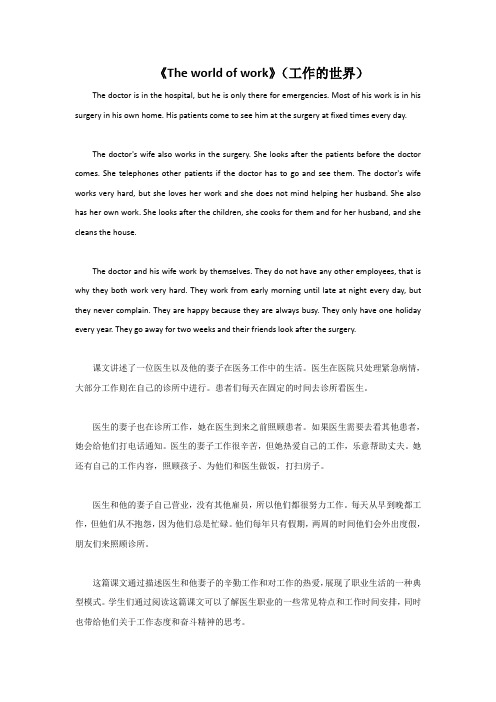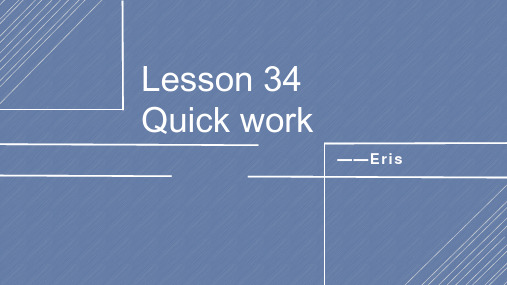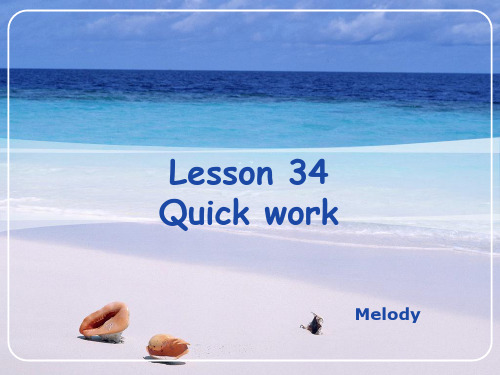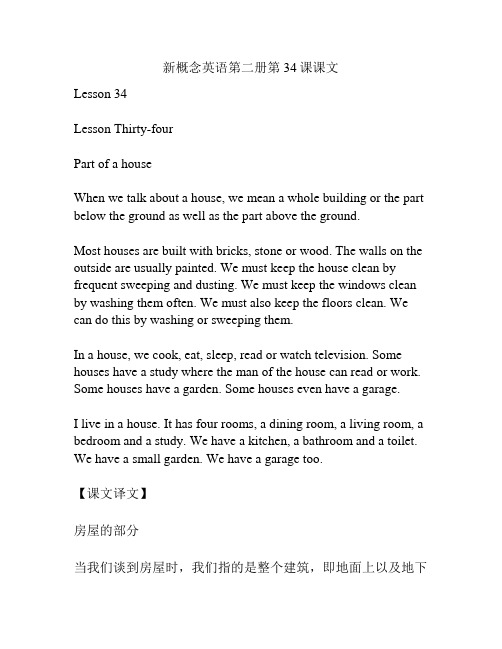新概念2-第34课
新概念第二册课文翻译及学习笔记【Lesson34、35、36】

新概念第二册课文翻译及学习笔记【Lesson34、35、36】【课文】First listen and then answer the question.听录音,然后回答以下问题。
How long had the police taken to find his bicycle?Dan Robinson has been worried all week. Last Tuesday he received a letter from the local police. In the letter he was asked to call at the station. Dan wondered why he was wantedby the police, but he went to the station yesterday and nowhe is not worried anymore. At the station, he was told by a smiling policeman that his bicycle had been found. Five days ago, the policeman told him, the bicycle was picked up in a small village four hundred miles away. It is now being sentto his home by train. Dan was most surprised when he heardthe news. He was amused too, because he never expected the bicycle to be found. It was stolen twenty years ago when Dan was a boy of fifteen!【课文翻译】丹.鲁宾逊焦虑了整整一个星期。
(完整版)新概念英语第二册课件(Lesson-34-Quick-work)

★ most [ məust ] ad. 最;相当,非常 e.g. the most important discoveries a most interesting movie
worry ['wʌri] ['wɜ:ri] adj.表示“焦虑的”、“担心的” e.g.: She’s worry. vt. 表示“使担心/发愁” e.g.: Nothing worries me vi.表示“忧虑,担心” e.g.: She appears to be worried about
wonder= want to know wonder whether/if/who/when/where/what/why
+ 从句”
她想知道那个孩子在干吗。 She wondered what the child was doing. 我想知道他来不来。 I wonder whether/if he will come.
一只睡着的狗 a sleeping dog
一张焦虑的脸 a worried face
• Five days ago, the policeman told him, the bicycle was picked up in a small village four hundred miles away.
accept &receive? 他已经接受了我们的邀请。
He has accepted our invitation. 我没有收到你的传真。
I didn’t receive your fax. accept: 强调主动地或自愿地接受,或者说,经过考虑后同意
接受。
receive: 着重仅仅接到或收到这一结论或事实,而不含采取主 动或积极行动的意思。
新概念二第34课课文原文

《The world of work》(工作的世界)The doctor is in the hospital, but he is only there for emergencies. Most of his work is in his surgery in his own home. His patients come to see him at the surgery at fixed times every day.The doctor's wife also works in the surgery. She looks after the patients before the doctor comes. She telephones other patients if the doctor has to go and see them. The doctor's wife works very hard, but she loves her work and she does not mind helping her husband. She also has her own work. She looks after the children, she cooks for them and for her husband, and she cleans the house.The doctor and his wife work by themselves. They do not have any other employees, that is why they both work very hard. They work from early morning until late at night every day, but they never complain. They are happy because they are always busy. They only have one holiday every year. They go away for two weeks and their friends look after the surgery.课文讲述了一位医生以及他的妻子在医务工作中的生活。
新概念第二册 Lesson 34课件

课文分析
【2】Last Tuesday he received a letter from the local police.
★local adj. 当地的,本地的
local news 当地新闻 local color 地方特色 local people 当地人
native ['neɪtɪv] n. 土著人 adj. 土生土长的
【练一练】 这是这个家庭最有趣的照片。 This is the most interesting photo of the family.
单词讲解
many和much的最高级 many--more--most much--more--most most绝大多数的(前面不加冠词)
例:大多数的男孩喜欢足球。 Most of the boys like football. 【练一练】:他们中的大多数都迟到了。 Most of them were late.
She wondered who that man was/ what had happened. 她想知道那个人是谁/到底发生了什么事。
She wondered what the child was doing. 她想知道那个孩子在干吗。
I wonder whether/if he will come. 我想知道他来不来。
For some reason, they called off the party.
【练一练】开始下雨了所以我们取消了比赛。
It began to rain so we called off the match.
【练一练】
1. I called _o_n__ you five times yesterday. Were you out?
新概念英语第二册第34课习题答案详解

新概念英语第二册第34课习题答案详解1. d根据课文第3行Dan wondered why he was wanted by the police… 能够判断d. he didn’t know why the police wanted him 是感到焦虑的真正原因,所以应该选d. 其他3个选择都是课文提及的情况,但不是他焦虑的真正原因。
2. a根据课文第8-9行Dan was most surprised… he never expected the bicycle to be found 能够判断,只有a. had probably forgotten all about his bicycle(可能把他的自行车早忘得一干二净了)符合当时的心情,是准确答案。
其他3个选择都不符合他当时的心理感受。
3. b(c)yet (d)anymore 都不符语法,因为它们常用于否定句中,而本句是肯定句. (a)even 不符合题意,应该同比较级连用才准确;(b)still 能够用在肯定句中表示仍然,还,所以只能选(b)still4. ca. had been finding 和 d. have been finding 都不是准确的时态,动词find(找到)强调结果,不应该用实行时态;b. had been found语态不对,因为本句的主语是人,是动作的执行者,故不能用被动语态;c. had found最合乎时态和语态,所以只能选c5. a本句是对地点提问的疑问句,回答是In a small village,只有a. Where 是问地点的,所以a. 是准确答案,而其他3个选择都不是问地点的。
6. da. to 和b. to be 都不合乎语法,因为以that引导的是从句,应该有主语和谓语,而不应该是用to引导的动词不定式, c. they也不合乎语法,因为主句动词是过去式,从句也应该是过去时态. d. they would 是过去将来时,最合乎语法,所以只能选它.7. c本句有表示过去时间的状语twenty years ago(20年前),所以应该用一般过去时。
新概念2第34课

1)n.(政府机关等)局、所、中心:供应站; (广播)电台 a police station 警察局a fire station 消防局 a power station 供电局 TV station 电视台
2)n.车站 A rail way station 火车站 站 A bus station 汽车
作将于三小时后完成。 The baby must be looked after well. 这孩子必须被好好照顾。
Text Explanation
Dan Robinson has been worried all week. 1.现在完成时表示过去一直延续到现在,并有可能继 续延续下去的动作。 2.be worried about sth 对…感到担心 3.all all all all week 整整一个星期 day long 整整一天 year round 整年 day and all night 整日整夜
Text Explanation
It was stolen twenty years ago when Dan was a boy of fifteen!
1.rob 与 steal 的用法区别 1) 从意思上看: rob 指公开地“抢”、“夺”(通常使用暴力); 而 steal 则指在人们不防备或不在场的情况下悄悄地“偷”。 2)从结构上看,两句所使用的句型完全不同 rob+被抢的人或地方+of+被抢的东西 steal+被偷走的东西+from+某人或某地
Text Explanation
It is now being sent to his home by train.
by by by by by train 坐火车 bus 坐公共汽车 road 通过陆路 sea 通过水路 air 通过飞机
新概念英语第二册第34课课文

新概念英语第二册第34课课文
摘要:
一、课文概述
1.文章主题:描述一个关于一位年轻女子Joanna的日常生活和兴趣爱好
2.文章结构:分为三个段落,分别介绍Joanna的早晨、下午和晚上活动
二、详细内容
1.早晨部分
a.Joanna起床时间及早晨习惯
b.早餐内容
c.前往工作地点的交通方式
2.下午部分
a.工作内容
b.下午茶的享用
c.下班后的购物活动
3.晚上部分
a.与朋友共进晚餐
b.晚间娱乐活动:看电影、跳舞
c.回家后的阅读习惯
正文:
新概念英语第二册第34课课文以一位名叫Joanna的年轻女子为主人公,生动地描绘了她的日常生活和兴趣爱好。
在早晨,Joanna会在7:30起床,然后进行简单的晨练,如做一些伸展运动。
接着,她会为自己准备一顿丰盛的早餐,包括牛奶、麦片、水果和面包。
之后,她乘坐公共汽车前往工作地点。
在下午,Joanna会开始她忙碌的工作,这包括处理文件、接听电话以及与同事讨论项目。
下午茶时间,她会品尝美味的蛋糕和红茶,以此放松自己。
下班后,Joanna喜欢去商场购物,为自己添置一些衣物和日用品。
晚上,Joanna有时会与朋友共进晚餐,谈论彼此的近况。
之后,她们可能会去看一场电影,或者去舞厅跳舞。
尽情娱乐之后,Joanna会在晚上10:30左右回到家中,在睡前进行一段阅读,以此结束她充实的一天。
这篇课文通过描述Joanna的日常生活,向我们展示了她健康、充实的生活方式。
新概念英语第二册第34课课文

新概念英语第二册第34课课文Lesson 34Lesson Thirty-fourPart of a houseWhen we talk about a house, we mean a whole building or the part below the ground as well as the part above the ground.Most houses are built with bricks, stone or wood. The walls on the outside are usually painted. We must keep the house clean by frequent sweeping and dusting. We must keep the windows clean by washing them often. We must also keep the floors clean. We can do this by washing or sweeping them.In a house, we cook, eat, sleep, read or watch television. Some houses have a study where the man of the house can read or work. Some houses have a garden. Some houses even have a garage.I live in a house. It has four rooms, a dining room, a living room, a bedroom and a study. We have a kitchen, a bathroom and a toilet. We have a small garden. We have a garage too.【课文译文】房屋的部分当我们谈到房屋时,我们指的是整个建筑,即地面上以及地下的部分。
- 1、下载文档前请自行甄别文档内容的完整性,平台不提供额外的编辑、内容补充、找答案等附加服务。
- 2、"仅部分预览"的文档,不可在线预览部分如存在完整性等问题,可反馈申请退款(可完整预览的文档不适用该条件!)。
- 3、如文档侵犯您的权益,请联系客服反馈,我们会尽快为您处理(人工客服工作时间:9:00-18:30)。
very:客观的陈述 e.g.: He is very tall. 他非常高
Last Tuesday he received a letter from the
local police.
accept &receive? 他已经接受了我们的邀请。
-What does he/she do? -He/She is a …
doctor nurse
hospital
-Where does he/she work? -He/She works in …
-What does he do? -He is a/an …
restaurant waiter
-Where does he/she work? -He/She works in …
something. n.烦恼;焦虑;担心 ,令人发愁的事 e.g.: Mother's illness was always a great worry to me.
1、Last Tuesday he received a letter from the local police.
the local police 当地警察局 local ['ləʊkl] adj. 地方性的,当地的,本地的
1. 从意思上看:rob 指公开地“抢”、“夺”(通常 使用暴力);而 steal 则指在人们不防备或不在场的 情况下悄悄地“偷”。
2. 从结构上看,两句所使用的句型完全不同:
•rob+被抢的人或地方+of+被抢的东西
•steal+被偷走的东西+from+某人或某地
•They robbed the bank of a lot of money. 他们从银行 抢了很多钱。
hear us. • I called _a_t__ the post office on my
way to work. • “Help!” the injured called _ou_t__to the
rescue team.
3、Ted wondered why he was wanted by the police, but he went to the station yesterday and now he is not worried any more.
station.
1)call at表示“对(某个人家或地方)进行短暂
访问”: e.g.: He calls at every house in the
street once a month. 他每月对这条街上的每户人家光顾一次 e.g.: He was asked to call at the police
pick up 1) 拿起,拾起: e.g.: I picked up the phone as soon as the
phone rang. 2) 用车接人: e.g.: I’ll pick you up at your office. 3) (不经意) 学到: e.g.: He picked up French in Paris. 她是在巴黎学会法语的
2)adj.大多数的,大部分的: Most doctors don‘t smoke. 大多数医生不吸烟。 3)adv.非常,很(相当于very,但通常用 于表达主观感情、见解等): This is a most interesting/ exciting story. 这是个非常有趣/激动人心的故事。(说话 者的观点)
4)call up “打电话(给某人)” e.g.: Jane called me up the other day 前几天,简给我打过电话
5) call off 可以表示“取消(某项活动)” e.g.: For some reason, they have called
off the meeting. 由于某种原因,他们把晚会/会议取消了
------Call------
1. call at 2. call on to visit
He was asked to call at the police station. George is calling on me tonight. (Less formal) 3. call out: shout 4. call up: telephone People on the bank called out to the man, but he didn’t hear them. Mr. Green will call you up tomorrow morning. 5. call off: cancel It began to rain so we called off the match. The couple decided to call off their reservation.
station.
2)call on 表示“拜访”、“探望”: e.g.: Have you called on George recently?
你最近去看过乔治吗?
3)call out表示“大声叫喊” e.g.: Some people on the bank called
out to the man in the boat. 岸上的一些人对着小船上的那人高喊
wonder ['wʌndə(r)] v. (want to know)
1. + (that) 从句
e.g.: I wonder (that) when we can arrive in Beijing.
2. + to / at 感到惊讶
e.g.: I wondered to hear her voice in the next room.
4)(无意地,顺便地)获得,找到: e.g.: I've picked up a bad cold.
我得了重感冒
most
1)adj.用于最高级,表示“最……”: This is the most beautiful can/ garden I‘ve even seen. 这是我见过的最漂亮的车/花园。 The most intelligent girl in this class is Jane. 这个班上最聪明的姑娘是简。
-What does he/she do? -He/She is a …
actor
-What does he/she do? -He/She is a …
singer
-What does he/she do? -He/She is a …
writer
-What does he/she do? -He/She is a …
coach
-What does he/she do? -He/She is a …
pilot
-What does he/she do? -He/She is a …
manager
-What does he/she do? -He/She is a …
policeman (policemen)
Police Station
n [C]. 奇迹 The seven wonders of the world
not......any more = no more 不再, 再也不
4、Five days ago, the policeman told him, the bicycle was picked up in a small village.
station ['steɪʃn]
2) n.车站 a railway station 火车站 a bus station 汽车站
e.g.: She got off at Victoria Station. 她在维多利亚车站下了车
worry ['wʌri] ['wɜ:ri] adj.表示“焦虑的”、“担心的” e.g.: She’s worry. vt. 表示“使担心/发愁” e.g.: Nothing worries me vi.表示“忧虑,担心” e.g.: She appears to be worried about
-What does he/she do? -He/She is a/an …
restaurant
waitress
-Where does he/she work? -He/She works in …
-What does he/she do? -He/She is a …
shop assistant
•They stole a lot of money from the bank. 他们从银行 偷了很多钱。
local color 当地色彩, 地方色彩 a local newspaper 地方性报纸 local news 本地新闻 local shops 邻近的商店 native [‘neɪtɪv] n. 土著人;
adj. 土生土长的
2、In the letter he was asked to call at the
He has accepted our invitation. 我没有收到你的传真。 I didn’t receive your fax. accept: 强调主动地或自愿地接受,或者说,
经过考虑后同意接受。 receive: 着重仅仅接到或收到这一结论或事实,
而不含采取主动或积极行动的意思。
rob 与 steal 的用法区别
• I called _o_n__ you five times yesterday.
Were you out? • It’s too late go to dinner. Why don’t we call the whole thing _o_f_f? • We called _o_u_t_ to him but he could not
